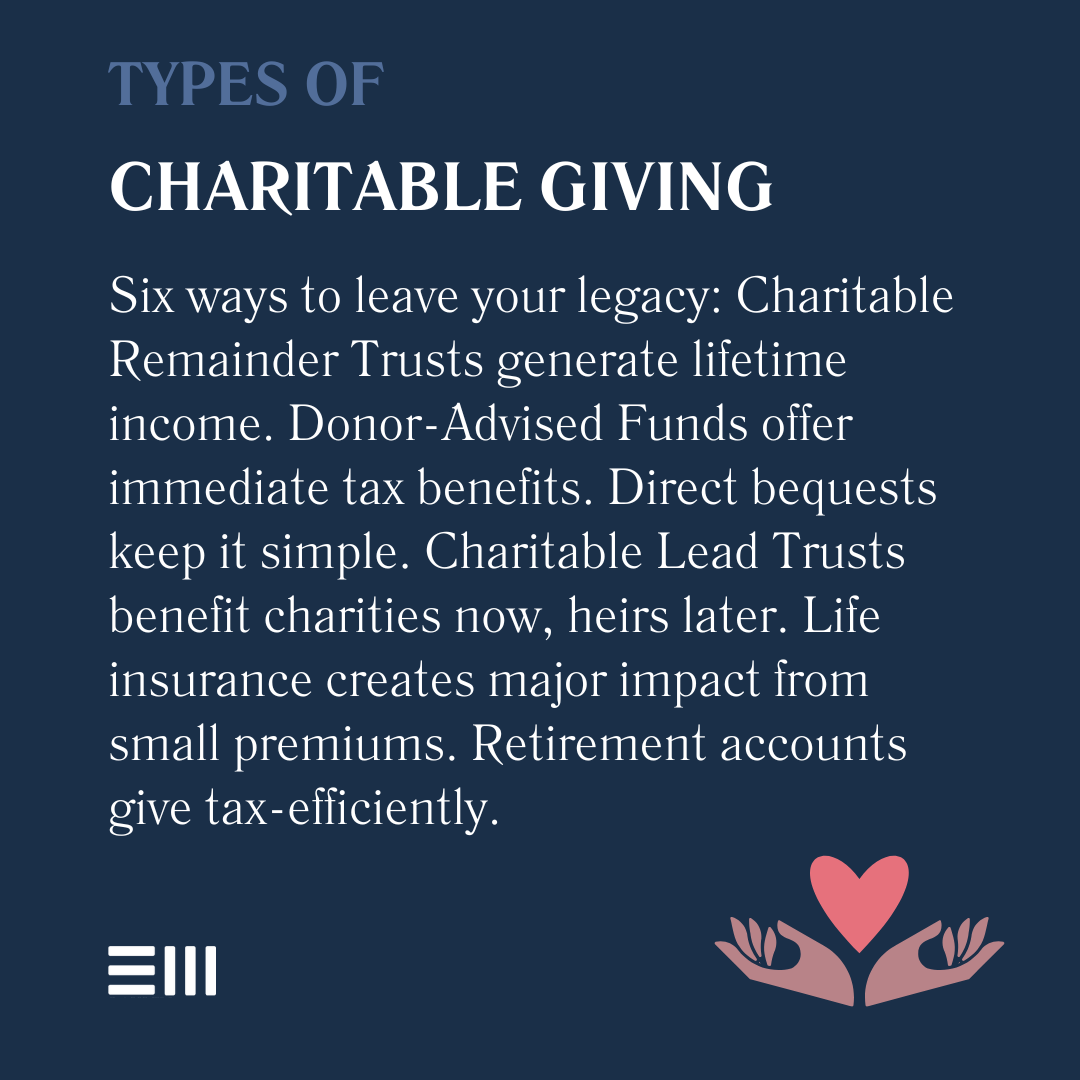In 2023, Americans donated over $557 billion to charitable causes, with nearly 9% of these gifts coming through estate plans and bequests.
This growing trend of legacy giving reflects how more individuals are choosing to extend their impact beyond their lifetime, transforming their personal success into lasting social change.
Understanding Charitable Giving in Estate Planning
Charitable giving through estate planning creates lasting positive change while potentially reducing tax burdens on your heirs. This strategic approach to philanthropy allows you to support causes meaningful to you while maximizing the impact of your assets.
Understanding the various methods and implications helps ensure your charitable intentions are fulfilled effectively.
Types of Charitable Gifts in Estate Planning
Before choosing your charitable giving strategy, consider these common options that can help you achieve your philanthropic goals:
- Charitable Remainder Trusts: Generate income during your lifetime while benefiting charities after your passing.
- Donor-Advised Funds: Offer immediate tax benefits and flexible giving options over time.
- Direct Bequests: Simple, straightforward gifts made through your will or trust.
- Charitable Lead Trusts: Provide income to charities now, with remaining assets passing to heirs later.
- Life Insurance Policies: Convert modest premium payments into substantial charitable gifts.
- Retirement Account Designations: Tax-efficient way to give pre-tax retirement assets.
- Real Estate: Donate property while potentially retaining lifetime use.
- Appreciated Securities: Avoid capital gains taxes while maximizing charitable impact.
- Private Foundations: Create lasting family legacies with greater control over charitable giving.
Each charitable giving vehicle offers unique advantages for different estate planning goals and financial situations.
Consider consulting with financial and legal professionals to determine which options best align with your objectives.
Benefits of Including Charitable Giving in Your Estate Plan
Incorporating charitable giving into your estate plan provides several advantages that benefit both you and your chosen causes:
- Reduced Estate Tax Liability: Charitable gifts can significantly decrease estate taxes.
- Income Tax Benefits: Many giving strategies offer immediate tax deductions.
- Creation of Family Legacy: Establish a tradition of philanthropy across generations.
- Support for Causes: Make meaningful contributions to organizations you value.
- Income Streams: Certain trusts provide lifetime income while benefiting charities.
- Asset Protection: Charitable planning can help shield assets from creditors.
- Family Unity: Shared charitable missions can strengthen family bonds.
- Recognition Opportunities: Leave a lasting mark through named gifts or programs.
- Teaching Values: Demonstrate important principles to future generations.
These benefits make charitable giving an attractive option for many estate plans, particularly for those with significant assets or strong philanthropic goals. Understanding these advantages helps inform strategic planning decisions.
How to Choose the Right Charitable Giving Strategy
Consider these key factors when selecting your charitable giving approach to ensure alignment with your goals:
- Financial Goals and Needs: Balance charitable impact with personal financial security.
- Impact on Beneficiaries: Consider how giving affects inheritance plans.
- Tax Implications: Evaluate different giving methods' tax consequences.
- Timeline Preferences: Decide between immediate and deferred charitable impact.
- Control Requirements: Assess desired level of involvement in charitable decisions.
- Family Involvement: Plan for potential family roles in charitable activities.
- Charity Research: Investigate organizations' effectiveness and stability.
- Professional Guidance: Seek expert advice on complex giving strategies.
- Regular Review: Plan for periodic assessment of giving strategies.
Taking time to evaluate these elements ensures your charitable giving aligns with your overall estate planning objectives while maximizing impact.
Frequently Asked Questions About Charitable Giving in Alabama Estate Planning
Alabama estate planning with charitable giving often raises important questions.
Here are detailed answers to common inquiries that can help guide your planning process.
What Charitable Organizations Can I Include in My Estate Plan?
You can include any qualified 501(c)(3) organization in your estate plan.
Research potential recipients thoroughly and verify their tax-exempt status through the IRS database. Consider an organization's financial stability, mission alignment, and long-term viability.
How Does Charitable Giving Affect My Estate Taxes?
Charitable gifts made through your estate plan can reduce your taxable estate dollar-for-dollar, potentially resulting in significant tax savings for your heirs. Strategic charitable planning may help reduce both estate and income taxes.
Can I Change My Charitable Beneficiaries Later?
Most estate planning documents allow you to modify charitable beneficiaries. Regular review ensures your choices continue to align with your values and goals. Consider including flexibility provisions in your plan.
Should I Inform Charities About Their Inclusion in My Estate Plan?
While not required, informing charities of their inclusion helps them plan for the future and may provide opportunities for meaningful engagement during your lifetime. Many organizations offer legacy society membership benefits.
How Can I Ensure My Charitable Gifts Are Used as Intended?
Create specific instructions in your estate planning documents, consider restricted gifts, or establish a charitable trust with clear guidelines for fund distribution. Regular communication with chosen charities helps align expectations.
What Is the Minimum Amount Required for Charitable Giving in an Estate Plan?
No minimum amount exists for charitable giving in estate plans. Even modest gifts can make meaningful impacts when directed thoughtfully. Focus on your personal giving capacity and goals rather than external benchmarks.
Start Your Legacy of Giving Today
Ready to create a meaningful charitable legacy? Our experienced Alabama estate planning attorneys will help you develop a strategy that maximizes your charitable impact while protecting your family's interests.
Schedule a consultation today to explore how charitable giving can enhance your Alabama estate plan and create lasting positive change.


